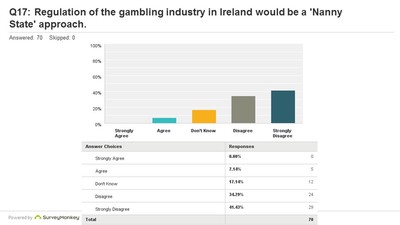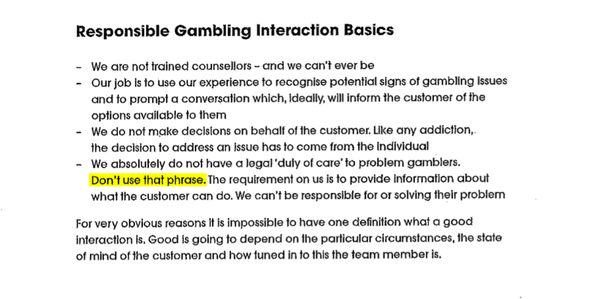|
The results of our Strategic Planning Survey are now available. The full document (PDF) can be downloaded here. I would like to thank everybody who took the time to give their views. It makes for very interesting reading and certainly challenged some of my own views on key topics.
As much as possible, I attempted to balance my own bias when creating the questions. One example is Q14: "I am happy with the amount of gambling advertising on Irish media (including social media)". This is not my position, but I did not want to "lead" survey respondents by posing the question, based on my own biased view. It was interesting that, in the case of this question, over 92% of respondents either disagreed (24.29%) or strongly disagreed (68.57%) with the statement. Other interesting results include:
The survey was sent to addiction workers, listed on the www.drugs.ie website, was shared on social media and was available on our website. While we are not claiming any statistical significance, the survey makes for interesting reading and has been invaluable in preparing our Strategic Planning for the next three years. Barry Grant, CEO & Founder, Problem Gambling Ireland.
2 Comments
It seems fair to say that we live in interesting times. Fine Gael and Fianna Fail's "love that dare not speak its name" has finally come to fruition; a serial-bankrupt, day-glo builder has been selected to rule the world; and a sports-show, funded by a betting firm, discusses gambling addiction three times over the course of one week. If you've been preparing for The Rapture, it's probably time to put on your Sunday best.
The sports-show in question is Newstalk's highly-popular Off The Ball. Last Sunday (27th November), they began their series of discussions with Declan Lynch. Declan had written an article in that day's Irish Independent, entitled: "Is it the right time to derail our gambling supertrain?" Declan has long been at the forefront of raising awareness around gambling addiciton in Ireland and doesn't pull any punches when it comes to highlighting some of the questionable practices of the gambling industry. At the time, I thought that this was a brave, if somewhat tokenistic move, on the part of the show's producers. Imagine my surprise when, just a few days later (1st December), Ger Gilroy interviewed recovering gambling addict and Tyrone footballer, Cathal McCarron, on the same show. Ger begins by saying: "I think that it's incredibly important that we talk about gambling addiction and about the industry, as well, particularly as, in the sports media, we have a very close relationship with the betting industry and sometimes that can be uncomfortable for us. On a personal level I have seen the devastation that gambling has wreaked on families and on careers." Ger goes on to show himself to be sensitive to, and knowledgable about, the harm caused by gambling addiction. Just when I was beginning to think that Christmas had come early - ALL of my Christmases came together. This manifested itself in the form of a third discussion on gambling addiction on yesterday's show (3rd December). The panel discussion included Declan Lynch, as well as addiction treatment specialist, Dr Garrett McGovern and recovering substance addict and poker afficionado, John Leonard (AKA, Sober Paddy). The discussion was wide-ranging, intelligent and nuanced. They covered everything from harm-prevention and harm-reduction to the pros and cons of the 12-step treatment model, gambling advertising and the "gamblification" of sport and the sports media. [By "gamblification", I mean the process by which the gambling industry has embedded itself into sporting bodies and media organisations by getting them hooked on their cold, hard cash.] By the end of the week, I had to take a long, hard look at myself. This no longer looked, sounded or smelled like tokenistic box-ticking from Off The Ball. In fact, this had the whiff of a group of people who might actually genuinely care about the harm that is caused by gambling in this country, while also struggling with the fact that they (and many of their colleagues) are overly-dependent on gambling industry funding. As an addiction counsellor, I am always looking out for dysfunctional "Black & White Thinking" in my clients. This sort of binary thinking is often a strong indicator of the type of cognitive distortions which can lead to addictions and other issues. "Life is lived in the Grey", I can hear myself saying, over and over again. However, when seeing the harm caused by gambling and other addictions on a regular basis, it can be easy to slip into a Good Guys vs Bad Guys mindset - or, in other words: "If you're not with us, you're agin' us!". As I work through my own internal conflict on this one, I have to commend Ger Gilroy and the rest of the Off The Ball team on grappling with the Horns of their own Dilemma. It can't be easy to watch the increasing harm caused by gambling in Irish society, while at the same time deal with the financial realities of commercial radio. At least by acknowledging that the "close relationship" can be "uncomfortable" for them, they, to my mind, are making a step in the right direction. As workers in the addiction field will often tell you, "The first step to recovery is admitting you have a problem".
Discussion on gambling starts around half-way through the clip.
Yesterday, it was widely reported that the international gambling operator, Paddy Power, was found, by the UK Gambling Commission, to have "encouraged a problem gambler (called 'Customer A') to keep betting until he lost five jobs, his home and access to his children". Many, who have an interest in the gambling addiction field, would not be surprised by this. What is surprising about this story is the fact that staff actually raised concerns about the problem gambler's situation, as he was working 5 jobs, but had "no money". For some readers, this may seem like basic common decency - like the bartender telling you when you've had enough. However, some weeks later, when the betting shop manager informed a more senior member of staff that the problem gambler in question would be visiting the shop less frequently, they were advised: “steps should be taken to try to increase Customer A’s visits and time spent in the gambling premises”. This type of sharp practice is "grossly at odds with the licensing objective of preventing vulnerable people from being exploited by gambling", according to the UK Gambling Commission. Unfortunately, in my time counselling problem gamblers, I have been told, time and time again, that this type of practice occurs across the board with all gambling operators in Ireland. Enticements are offered to gamblers who are clearly in active addiction - which is not strange, considering that in most jurisdictions, at least 35% of gambling industry profits are made from problem gamblers (data for Ireland is not currently available). In fact, a gambler is far more likely to be barred from a gambling establishment if they are winning regularly than if they are losing every penny they have - potentially leaving themselves and their families destitute. Customer A was only advised to seek help for gambling addiction in August 2014, when a Paddy Power staff member met him on the street and learned that he had lost all of his jobs, was homeless and had lost access to his children. The "responsible gambling" page of Paddy Power's website states: "We believe in fair play – not just for customers enjoying a bet, but in everything we do – and our practices are among the most responsible in the industry. We know that some people have problems with gambling, and we recognise that they need education, treatment, and support. All of our customer service agents are certified by GamCare and undergo regular GamCare training to ensure they offer the most professional service possible to those who might be suffering from a problem with gambling." I do not want it to seem like I am on a crusade against Paddy Power. This type of immoral, unethical practice exists across the gambling industry. A brief look at the William Hill Staff Handbook (below), shows the typical attitude. Regulation of the gambling industry is the only approach with any hope of having an impact on these utterly parasitic and predatory practices. Gambling operators consistently prey on vulnerable addicts, with little or no concern for their welfare or that of their children and other dependents.
I urge the new government to enact the Gambling Control Bill as soon as humanly possible. In 2013, the Heads of the Gambling Control Bill were published. The purpose of the proposed legislation is to replace the out-of-date and un-fit for purpose, Betting Act 1931 and the Gaming and Lotteries Act 1956. The proposed legislation seeks to regulate gambling in order to ensure:
All of these proposed measures would be welcomed by Problem Gambling Ireland, as the current vacuum in legislation only serves to create an environment where gambling-related harm can thrive. A dedicated Gambling Regulator with the power to press criminal charges against gambling licence-holders who breach the proposed laws would greatly reduce some of the sharp practices currently in evidence. Also, a Social Fund, into which gambling licence-holders would be compelled to contribute, would greatly increase the provision of dedicated gambling addiction services in the areas of treatment, prevention, education, research and evaluation. However, the response from one of Ireland's Gambling Industry heavy-weights, Paddy Power, may be indicative of the general attitude to the proposed legislation within the industry. In their submission to government in relation to the Heads of the Bill, they stated "We are concerned however by the proposal to apply the contribution to the Social Fund based on turnover (Head 80) given the intense international competition for online gambling and the narrow margins which generally apply for gambling products. We would encourage the Department to explore models from other jurisdictions that have similar systems in place which are working effectively, for example the UK where operators contribute voluntarily to the Responsible Gambling Trust (RGT) on a flat rate based on scale". It is worth noting that only 63% of gambling licence-holders in the UK actually contributed to the fund in 2014/2015 and that they raised the paltry sum of £6.5 million from an industry which posted profits of of £1.42 billion in 2013 from Fixed Odds Betting Terminals alone. Paddy Power's pre-tax profits for 2014 were €166.6 million. Surprisingly, Paddy Power, who are renowned for pushing the boundaries in their advertising campaigns, also took issue with the Department of Justice's proposals in relation to advertising and sponsorship. The gambling giant would prefer Codes of Practice and Codes of Conduct in gambling advertising (which already exist) rather than primary legislation. Paddy Power give the following example: "a failure to remove online promotional material within 12 hours could trigger a summary prosecution and sponsorship of an adult sports team which has one 17 year old player would infringe Head 74. We would respectfully query if such granular restrictions would be workable in practice.". I have no doubt that Paddy Power and other gambling industry members would have some difficulty with any restrictions, granular or otherwise, as it limits their ability to actively encourage problem gambling (which generates up to 75% of gambling industry profits in some jurisdictions) and to (inadvertently) promote gambling to children by advertising before the watershed and through sports sponsorship. Some facts on gambling in Ireland and globally:
On behalf of the estimated 240,000 people in Ireland, whose lives are negatively impacted by gambling-related harm, all of us at Problem Gambling Ireland ask that the new Government act quickly to enact the Gambling Control Bill. |
|




















